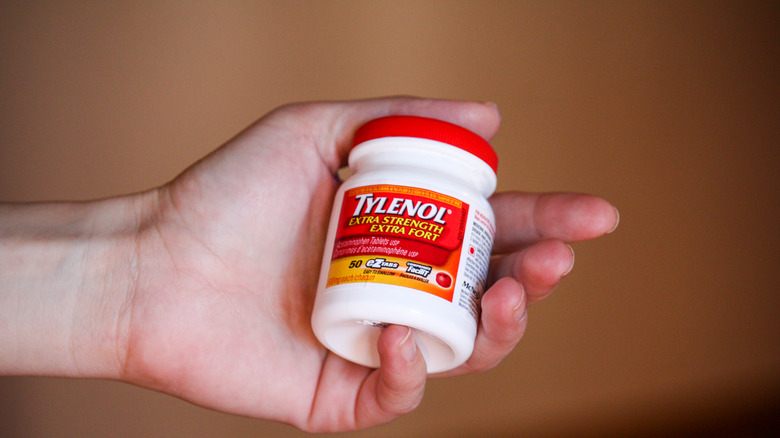You Might Be Allergic To Acetaminophen If This Happens
Acetaminophen, the generic drug known as Tylenol, is a common over-the-counter staple for pain and fever relief that you can find in many medicine cabinets. Some medications used to treat allergies, cold symptoms, flu, and sleeplessness have acetaminophen in them (via U.S. Food and Drug Administration). But acetaminophen may not be palatable for everyone. In fact, some people may be allergic to it.
So how would you know if you're allergic to acetaminophen? The telltale signs of an allergic reaction include hives, itchiness, swollen or blistered skin without a fever, hoarseness, a rash, swelling around the outside or inside of mouth, throat or chest tightness, difficulty breathing or swallowing, and/or wheezing (via Drugs.com).
If you experience any symptoms of an allergic reaction after taking acetaminophen, you should stop taking the medication and seek medical attention. You should also be mindful of any other symptoms you have and if they continue to worsen.
Where you're most likely to see an allergic reaction
This all may sound troubling, but don't go throwing out your Tylenol bottles just yet. Experts say that experiencing an allergic reaction to acetaminophen is rare, but if you do experience a rash, there is a typical place to look for it. Registered nurse and medical educator for Nurse Together Jenna Liphart Rhoads, Ph.D., told Best Life that a rash caused by acetaminophen can be found anywhere on the body, but most likely will be on the "central portion," like the chest, back or stomach.
If you ever experience any allergy symptoms after taking acetaminophen, it is best to consult with your medical team, because continued exposure could worsen your reaction. Those who do experience a reaction to acetaminophen may be able to use it again at some point — but that should only happen under medical team supervision, to ensure your safety.
You will also want to avoid other products that may contain acetaminophen, and consult with your doctor on alternatives for pain relief.


